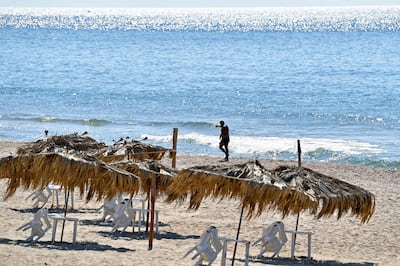US special envoy Amos Hochstein will visit Beirut next week and is expected to attend the ceremonial signing of the maritime agreement between Lebanon and Israel, which was brokered by Washington this month.
Mr Hochstein announced his visit during an event hosted by the Middle East Institute in Washington on Tuesday.
The visit marks the official ceremonial signing of the maritime border deal that was reached on October 11 between Lebanon and Israel, which is likely to take place next Thursday at the border town of Ras Naqqoura, a Lebanese diplomat told The National.
Mr Hochstein said the details of the ceremony had not been finalised.
“I don't think we have selected a date yet for the signing. We are working on the details and the choreography,” he said.
To avoid any hint of normalisation with Israel, the Lebanese side has rejected a joint appearance with the Israeli delegation, and has insisted on a separate signing of the agreement.
The deal is historic and resolves the long-running maritime dispute and control over what are thought to be highly productive oil and gasfields that straddle both sides of the border.
The agreement will delineate the maritime border between Lebanon and its southern neighbour for the first time since Israel was established in 1948.
The two nations are bitter foes and have fought several conflicts, including through the militant group Hezbollah.

Mr Hochstein said he intended to work on Egypt and Jordan's stalled agreement with Lebanon through the World Bank to provide electricity and gas to cash-strapped Beirut.
To pipe gas through Syria is not a breach of US sanctions, he said.
“We are going to work with the World Bank and Treasury Department to make sure that it first doesn’t affect any sanctions, which I think we are OK on, but we will have to have a determination formally,” Mr Hochstein said..
At the same event, the Deputy Speaker of the Lebanese Parliament, Elias Bou Saab, said the year-long negotiations were excruciating and almost fell apart.
“There were tough negotiations," Mr Bou Saab said. "We reached points on more than one occasion — now we're saying it publicly — [when we wanted to say] 'the deal is over'."
He hoped that Lebanon would be able to attract foreign investment after the agreement, even if gas exploration on its shore could take up to six years.
Paul Salem, president of the Middle East Institute, called the agreement “historic” and one that could grant Lebanon a lifeline out of its economic collapse.
“It's a bit of good news for a country that's otherwise is in very desperate conditions,” Mr Salem told The National.
Mr Salem also regarded the agreement as one that brings Lebanon and Israel away from escalation.
But he cautioned that Beirut had to undertake several steps to make sure it was a successful implementation.
“The government and the parliament have to prepare the structures legislation, illustrative decrees, which would organise the sovereign wealth fund,” Mr Salem said.
The fund will be used to collect revenues from gas production in Lebanon in a way that would ensure transparency and minimise corruption.
Mr Salem said Hezbollah's decision not to block deal was probably caused by Lebanon's economic crisis.
“They had relied previously on an economy that was generally functioning, so now they've realised that they need to do something," he said.
"The crisis impacts Hezbollah’s constituency as much as everyone else in Lebanon."











